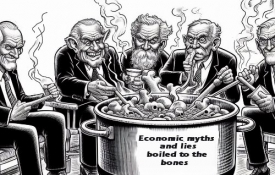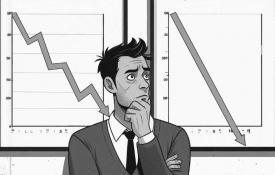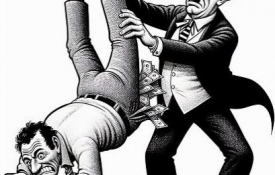Categories
-
0 Boiling our economic problems down to the bone
- Economy
- by Adrian Mark Dore
- 25-02-2024
0.00 of 0 votesMost people know that our economy isn’t working properly and that it serves the needs of a few at the expense of the many. That’s a major problem because, in a democracy, the economy is supposed to serve the majority's needs, not the needs of a few. This is ECONOMIC APARTHEID, and it’s as bad if not worse than political apartheid, which every government in the world has condemned. Yet they condone Economic Apartheid – really, how stupid! In this article, I boil down all the economic myths and lies to reveal the bare-bone truth about our economy. And as the old witch doctors of the past told us, “The bones show us the truth.” So here are the six bones of truth we are left with after all the myths and lies have been boiled away. We need to serve our four primary capitals equally. We currently serve only one of the four – Financial Capital - at the expense of the other three – Human, Environmental and Common Capital. This is why we have a highly dysfunctional economy. Free market policies are responsible for our dysfunctional economy as they serve Financial Capital exclusively at the expense of the other three primary capitals. Free market policies encourage and support the circumvention of laws and regulations. Free market policies call for small governments, thus limiting the government's ability to impose adequate regulations and oversee them properly. This provides the ideal circumstances to circumvent laws and regulations (through the use of top lawyers and accountants.) This practice is so rife it's frightening. Examples of these “legal circumventions” – cheating by another name - are everywhere. They are morally bereft, but what can one expect from a system only concerned with Financial Capital interest? As an example, take UK sanctions against Russia for their war against Ukraine. The government stopped businesses from exporting goods that could be used in war, but that didn’t stop leading British corporations from circumventing the rules. Exports directly to Russia stopped, but they found other routes to maintain their supply to Russia. The truth is that business is driven by one objective only – serving Financial Capital needs, period. Therefore, any economic system that allows business too much leeway must expect high levels of exploitation by morally bereft businesses. Free market policies have led to the growth of the Rentier economy and Globalisation. The development of both these phenomena is detrimental to the majority. Free market deregulations have led to a dysfunctional financial and investment sector. Both developments are detrimental to the majority. Free markets do not support or encourage measuring and managing our three other primary capitals. We are left with a warped and false reflection of the true state of our economy. A financial perspective gives us less than a 15% reflection of the state of our economy. Just like the Book Value of a business poorly represents the Market Value of a business – because financial matters only form a small part of the bigger picture. We are in a mess because free market policies have distorted reality. We live in some “noddy world” so far from the truth (or reality) that it’s a joke, except it's too sickening and sad to be called a joke. Conclusion – what the bones tell us.We need to replace our disastrous economic policies with a more balanced approach that gives greater consideration to the other three primary capitals, such as a social market policy. The clue is in the name. A social market policy cares for society (which embraces Human, Environmental and Common Capital) and the markets (Financial Capital.) A balanced approach. When will we end the madness of free market economic policies? Haven’t we learned our lesson by now? Let's hope the reading of the bones – convinces everybody to call for change. You may read other articles by Adrian Dore on Medium at https://medium.com/@adrianmarkdore/
-
0 Our economy is the source of our problems – is there a solution?
- Economy
- by Adrian Mark Dore
- 13-12-2023
0.00 of 0 votesAll major social, environmental, and economic issues have their roots in the economy. We have to appreciate how central the economy is to our lives if we are going to address these issues. Our economy is dysfunctional. By that, I mean it does not serve its intended purpose. Hence, this dysfunction causes major social, environmental, and economic problems. The extent of dysfunction is vast, covering every facet of the economy, resulting in major problems for all. While economic issues and their interrelationship with society and the environment are complex, the solution to the problem is remarkably simple. The economy is run following a broad set of rules or policies (known as economic policy.) If these rules are wrong, and by wrong, I mean they don’t serve the intended purpose of the economy, then, understandably, the economy will be dysfunctional. So, what is the intended purpose of the economy? To serve majority needs. By inference, to be able to serve majority needs, we also have to serve environmental needs, upon which our existence is predicated. However, this is only part of the picture. To pay for improved social standards (or quality of life), we need a vibrant business sector (or market.) A social market economic policy serves both markets and society equally. Hence, we need social market economic policies to provide crucial balance. Our current economic policies are based on a mixture of free market (or neoliberal ideas) and social market ideas, with a strong and ever-increasing bias towards free markets. We have lived predominately under the yoke of free markets for over four decades. This imbalanced approach lies at the heart of our problems, which is the simple truth of the matter. If the basics are wrong, then everything goes wrong. It’s as simple as that. If the problem is easy to identify, the solution is equally so. The next part of this article describes how bad free market policies are – just how diabolically bad they are. You don’t have to read this part because the point has already been made that free market policies don’t, and cannot, meet our requirements of a balanced economic policy and must be replaced urgently. The problems we face today are huge. I don’t need to elaborate; they are all around for you to see. While the problems are obvious to us all, most are unfamiliar with how bad our economy is because it’s purposely hidden from us, but here’s a quick guide. I start with our economic policy as it sets the overall rules governing our economy. As already stated, it’s predominantly a free market policy. This policy embodies three basic precepts: 1) Low taxes (particularly on the rich and corporations), 2) Fewer business regulations and 3) Smaller governments. All this is intended to favour financial capital, the owners of which are the rich. Hence, it has justifiably earned itself the alternate names of Economic Apartheid and Neofeudalism. All three precepts are bad for everybody apart from the rich, but two are particularly bad: fewer regulations and small government. With fewer regulations and poorer government oversight (which is typical of small governments), power shifts to the rich to do whatever they wish – to exploit the weak and vulnerable. With lower taxes, they have been able to push their exploitation further and faster into every nook and cranny of the economy. In its own right, free markets are bad enough, leading to Economic Apartheid, but it has also led to these additional adverse effects. The growth of the Rentier Economy (also known as the Blood Sucker economy as it’s the non-productive economy, earning its income from rent and expanding the Vacuum Up Vacuum Up systems enable the rich to exploit the weakest and most vulnerable in society, vacuuming up every morsel from their meagre table. The growth in Globalisation (also known as Gobbelisation as it gobbles up most domestic manufacturing, vital to a thriving economy. It unduly increases corporations' negotiating powers and leaves countries politically vulnerable.) The corruption of the Banking sector. Fewer regulations and oversight led to the 2008 financial crisis. It’s now a dysfunctional money-making sector for the rich. The corruption of the Investment sector. Our investment sector bears little resemblance to a true investment culture; instead, it’s a short-term trading farce with innumerable disadvantages to society. Again, thanks to limited effective regulation and oversight. The growth in rampant Consumerism. Without a balanced approach to economic development, little regard has been given to environmental and sustainability issues, but rather the importance of driving higher profits through greater consumption. The maintenance of inadequate and misleading measurement standards. Free market policies only focus on financial success, so ensure only financial measures govern business and the economy when we need more balanced and inclusive measures. They don’t want these inclusive measures as they would highlight how badly we are really doing against almost meaningless financial results. Post World War II, many countries followed a social market policy, but since the 1980s, the cancer of free markets has spread, leaving the majority and their economies weaker. Following the collapse of Germany in 1945, Chancellor Adenauer implemented a social market economic policy which oversaw a “Wirtschaftswunder” – an “economic miracle” that transformed it from post-war devastation into a leading developed nation. The Nordic model has seen the Scandinavian countries enjoy a high quality of life and strong economic growth, but unfortunately, it, too is coming under increasing pressure from free markets. Soon, they too will lose this high quality of life and endure poor economic prospects – for what? So the rich can become richer. This is what we need – an economic miracle that will snatch us from the crushing stupidity of free markets. Free market policies, with only the most cursory investigation, show they cannot meet the needs of our economy and never will, but governments keep replicating their mistake in following it year after year. You may read other articles by Adrian Dore on Medium at https://medium.com/@adrianmarkdore/
-
0 Why do they lie to us about taxes?
- Economy
- by Adrian Mark Dore
- 29-11-2023
0.00 of 0 votes“Taxes are a burden from which you receive little or no benefit” is the popular notion promoted by the rich and their puppets, the politicians. This is nothing more than a bare-faced lie intended to promote their free market agenda of cutting taxes, particularly on the rich and corporations. Governments collect taxes to invest them wisely for the benefit of the majority. They invest them in what we broadly refer to as Common Capital – the wealth we all share. It is used to provide infrastructure and services to all citizens and businesses. Common Capital investment distinguishes developed from developing economies. Life is easier and better for citizens and businesses in a developed economy rather than a developing economy because of this investment. Think how badly off you would be without roads, hospitals, schools, universities, social security, services, police, judiciary, defence, and everything else. All the things taxes fund – in other words, our Common (Shared) Capital. As taxes fund Common Capital, we weaken society and the economy to everybody's detriment if taxes are reduced, particularly on the rich and corporations (those who benefit the most from the economy and can contribute the most). To escape paying higher taxes, the rich proposed an alternate solution. They claimed that reducing taxes on them and corporations and minimising trading restrictions would allow them to invest more in our economy and grow government revenues. From this increased economic base, we would all benefit. This is what they promised but have never delivered on. Consequently, Common Capital has declined significantly, and as a result, so has the quality of life of the majority plummeted as it’s directly linked to Common Capital investment. We are moving backwards and are now more representative of a developing rather than a developed economy. The promise of the rich, through their hare-brained free market policies, has not delivered and never will. Read my article Free market policies — the broken agreement. | by Adrian Mark Dore | Medium. Consequently, we need to revert to high personal tax rates on the rich, alleviating the burden placed on the hard-pressed middle class while also pushing corporate taxes up much higher. This will allow the government to reinvest in Common Capital and establish the correct growth base. There’s a simple principle at play here. When you have a strong society, you have a strong, resilient economic base with inbuilt stabilisers. There is a direct correlation between societal well-being and that of a strong economy, which free marketeers want to hide and mislead you about. That is why tax is not a burden because the government is making wise investments to improve the quality of life for all by investing in – infrastructure, health, education, security, social support, policing, defence – the list goes on and on. Here’s a question for you – when it comes to taxing the rich and corporations, would you tax them now, using high tax rates with the certainty of high tax revenues, or rather wait on the vague promise of higher revenues made by people who have yet to deliver against this promise? Of course, this is a stupid question because the answer is obvious. Who in their right mind can trust the self-serving rich and corporations to serve anybody other than themselves? People who have proved their promises are worthless. Normally, when somebody breaks a promise, you become wary of them. You find out what they have been getting up to. To discover they are not reinvesting in our productive economy as promised but rather in the rentier economy and globalisation, which is harmful to the majority. You learn they have done so because this offers them greater returns. They are not remotely interested in acting on behalf of the majority; they are hurting them. Then, as a wise and responsible government, you repeat your mistake of trusting them year after year for over forty years. This is stupidity personified. Tax cuts on the rich and corporations are unjustified no matter which way you look at it. Tax rates on both must be raised significantly and immediately. Of course, the rich will squeal like fat little piglets, but that should not concern us. Our corrupted politicians (puppets of the rich) naturally tell us differently. They will tell you that corporations will relocate if we don’t offer attractive tax rates. This is true; corporations do revert to strongarm tactics (blackmail), which politicians pander to. Free market policies, in the form of globalisation, have given corporations negotiating strength (one of the many disadvantages of globalisation.) However, corporations don’t hold the upper hand; governments do because they control access to their markets. Access to these markets is of paramount importance to corporations. If they threaten to relocate, they cannot access our markets on the same terms as if they resided here. You can’t expect access to a market if you don’t contribute to its upkeep. Hence, access must be linked to a comparable tax contribution in whatever form that takes. As business people are keen to sprout, “There’s no such thing as a free lunch”, is an idiom which aptly applies here. The spineless politicians will respond that this is against free market trade agreements. These are the same ridiculous agreements they agreed to, which destroy our domestic manufacturing and leave us vulnerable to corporate blackmail, where they do not contribute adequately to the maintenance of our Common Capital. Politicians got us into this pickle, so now they can get us out by breaking these agreements. To stop the downward cycle in quality of life for the majority, our spineless politicians must increase the reduction in Common Capital investment by taxing the rich and corporations heavily. Paying tax isn’t something we welcome, but try and see it in a different light, not as an unnecessary burden but as something that protects and helps you live a fuller life. Try and see taxes as insurance and investment for you and your family because that’s precisely what they are. You hold these negative perceptions of tax by design. The rich minority promote the idea of taxes as a burden because it’s part of their free market economic policies, which call for lower taxes. By getting the majority on their side by thinking high taxes, particularly on the rich and corporations, are wrong, they succeed in swaying government support for their flawed ideas. Like most free market ideas, they are fundamentally wrong, hurting the majority. When you see taxes in a different light of protecting you and helping you live a fuller life, you appreciate why cutting taxes, particularly on the rich and corporations, is seriously wrong. You may read other articles by Adrian Dore on Medium at https://medium.com/@adrianmarkdore/
-
0 Money – the root of all evil. Not quite!
- Economy
- by Adrian Mark Dore
- 01-11-2023
0.00 of 0 votesIf you think money is the root of all evil, or if you only partially believe this to be true, then how would you classify the fountain or source of money-making? Surely, the source which enables the rich to make so much money unfairly and unjustly through crooked systems at the expense of the majority is more evil than money itself? Systems rigged to make the rich richer and the poor poorer are pure evil. Obviously, money is an inanimate thing and, as such, is neither good nor bad, but systems intentionally designed to create economic and social injustice are, and that’s what a lot of us find disgusting and immoral. In a democracy, the economy is supposed to serve the majority, but the rich have corrupted the course of democracy by influencing governments and implementing systems which serve their needs and not those of the majority. So, what are these crooked systems? The government runs the economy in accordance with a set of economic policies. Most leading Western economies are mixed economies comprising both free market and social market elements. However, they are predominantly free-market economies and moving progressively towards greater free-market dominance. That’s the problem – that’s the crooked system I’m talking about. It represents what I call the TRIAD OF EVIL, as free market policies favour markets over society and have directly led to the growth of three undesirable economic phenomena, namely: - Economic Apartheid (another name for free market economic policies. It is also known by another name of Neo-Feudalism.) It has justly earned these synonyms as it supports the rich exclusively, creating a situation where a small minority benefits from economic activities to the exclusion of the majority. It is returning us to a feudal system with a few masters and many slaves. This is not a supposition, but hard facts based on four decades of evidence of growing economic and social inequality. (Read this article for more details Economic apartheid.. We live in an era of economic… | by Adrian Mark Dore | Medium ) However, this is only part of the problem. It has directly led to the growth of the other two elements comprising the Triad Of Evil. Gobbelisation (a play on the word Globalisation to show how a few countries, such as China, have gobbled up critical manufacturing resources from all leading economies.) The loss of manufacturing is a serious disadvantage to any economy. We have been lied to when told that services make up for the loss of manufacturing. The truth is they don’t and never will. We are much weaker economically, socially, and politically due to the loss of local manufacturing. Free market strategies are directly to blame for this catastrophe. Read this article to learn more about the adverse effects of losing our manufacturing. The loss of manufacturing hurts you. | by Adrian Mark Dore | Medium Bloodsucker Economy (also known as the Rentier Economy.) Our economy is split into two parts – the productive or normal economy and the unproductive or rentier economy. The rentier economy, as the name implies, deals with businesses involved in renting out assets. This requires no productive output. They receive a rental income from their asset without lifting a finger. We depend on our normal or productive economy to drive our economy. However, the rentier economy often offers investors higher returns and lower risks, so it attracts considerable investment. Money is thus diverted away from our productive to the unproductive economy, weakening the productive economy upon which the majority depend. For many years, we were sold the lie that “trickle-down economics” worked, where we needed to leave as much wealth in the hands of the rich as they would invest it wisely, and we would all benefit. We now know that was all a lie because we have not benefited. In fact, to the contrary, we all suffered as they did not invest in the normal, productive economy but rather in the unproductive, rentier economy for their own exclusive benefit. They developed systems which have vacuumed up every morsel from the poor man’s table, making them even poorer. “Vacuum Up Effect” is a reality, while “trickle down” is a lie. Read this article for more details Vacuum Up — the reality. Trickle Down — the lie. | by Adrian Mark Dore | Medium The Triad of Evil is only the beginning of rampant economic corruption. The corruption extends to include a dysfunctional banking sector, a dysfunctional investment culture and inappropriate and inadequate measurement standards, which only account for financial interests. If, at this stage, the message is not blatantly clear that our entire economy has been corrupted, I’m not sure there is anything else I can say. Bear in mind the corruption which has spread across the economy has also spread across civil society to include academia and most of our institutions. This is to numb our intellectual capacity and limit us from challenging the establishment so they can continue on their merry way to rob the majority and enslave us. You may read other articles by Adrian Dore on Medium at https://medium.com/@adrianmarkdore/
-
0 Neoliberalism and other fairy tales.
- Economy
- by Adrian Mark Dore
- 29-10-2023
0.00 of 0 votesOur economy is based on certain philosophical precepts or ideas. If these ideas or precepts are wrong, then our economy won’t work properly. It won’t serve the needs of the majority; it will be dysfunctional. That’s why it’s important that our economy is built on rock-solid ideas, not on fairy tales about how it is supposed to serve the majority, but rather on how it actually serves them. So, that’s the big question you face – do you believe and support the neoliberal (or free market) ideas which currently underpin our economy, or do you reject them as the cause of our major socioeconomic and environmental problems? If you believe in goblins, gnomes, and the tooth fairy, then you may just believe in the neoliberal fantasy world. Otherwise, you will struggle to make much sense out of the baloney they sprout. Of course, if you are one of the elite rich making more money out of their lies than you can cope with, then I will understand why you support the absurdity, which is neoliberalism (also known as neo-feudalism or economic apartheid.) The rich, although only a tiny minority, are extremely powerful. So much so that they have been able to divert the course of democracy by implementing policies and strategies that benefit them while hurting the majority. They have managed to do this by lying and misleading us. Only through mass awareness and action can we take them on and reverse their elitist policies. We are living under a form of Economic Apartheid, where only the rich benefit. Let’s start by understanding the lies we’ve been fed. As I said earlier, if the basic precept or idea underlying a hypothesis is flawed, then the policy is nothing more than a flawed policy. Of course, this depends on your point of view. If you hold an elitist point of view, then it's not flawed but an extremely effective policy. However, if your point of view is that of an average person, then it stinks. As economic policies are supposed to serve the majority – it’s a smelly, horrible mess. Free market policies comprise three key ideas. Self-regulating markets. Spontaneous order of markets, and The importance of individual freedom. With these three ideas, they are trying to justify policies which call for small governments and limited regulation. This, in turn, leads to lower taxes and less government oversight and regulation. This being their primary goal because, with less government oversight and control, that puts them in a strong position to implement policies which favour them rather than the majority or the environment. Lower taxes are a bonus (a big one.) Let's look at these nonsensical claims one by one. 1. Self-regulating markets – really? Pull the other leg. A self-regulated system generally refers to a system which brings itself back to equilibrium without intervention. However, this does not accurately describe the interrelationship between supply, demand, and price, which they use to justify the claim that markets should be left alone to self-regulate. Far from self-regulating, all three elements are easily manipulated to favour one party over others. So, what this interrelationship actually shows us is that all business processes are interrelated with one another, not just supply, demand and price. Business functions as a causal model (i.e., a cause-and-effect model.) The common denominator of all business processes is not a monetary figure but rather a value measure. The purpose of each business process must be to add value to the business. Hence business functions as a value creation causal model. We need to understand this model and all its interrelationships to optimise business value creation for the benefit of society. This requires wider measurement and management, with greater government regulation and oversight, not less. 2.Spontaneous order of markets – another baseless ruse to mislead us. What they mean by spontaneous order is that when individuals pursue their own self-interest by buying and selling goods and services, they unintentionally contribute to the overall order of the market. According to them, competition and market dynamics lead to the efficient allocation of resources without a central authority directing these actions. They use this argument to claim we don’t need big governments. Entrepreneurial drive is good, but when unfettered, it's bad, as it becomes a matter of self-interest over social interests. This is not a question for debate. The economy is supposed to serve the majority, not minority needs. We are not challenging the entrepreneurial spirit; I’m saying it needs to be controlled through careful oversight, and that requires big government. Spontaneous order of markets is a red herring intended to confuse and mislead you into believing there is no need for big government, regulations, and oversight when there is. 3. The importance of individual freedom – another red herring. The idea that if you want greater individual freedom, then you require smaller governments, less regulation and oversight is a fallacy. In fact, the opposite is true in a democracy. The difference between emerging and developed economies is their investment in Common Capital. This is all the money the government has invested over time in building infrastructure and providing high levels of services to its citizens. Common Capital is what distinguishes developed economies from developing economies where their investment is substantially lower and thus their quality of life is lower. Their judicial systems, level of policing and many other “basics” protecting individuals and allowing them to exercise their full potential are not as good as in developed economies. All thanks to BIG GOVERNMENTS and their investments in COMMON CAPITAL. This helps businesses grow and prosper far better than in an emerging economy. So, if you think small government, limited regulation and oversight benefit you - go and live in a developing economy, otherwise wise up to the need for big government, regulations, and oversight. Now you understand why the three basic ideas underlying neoliberalism (aka free markets, neo-feudalism, or economic apartheid) are flawed and why our economy is dysfunctional. You may read other articles by Adrian Dore on Medium at https://medium.com/@adrianmarkdore/




